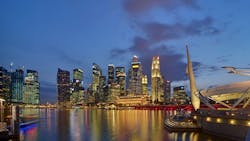Singapore Still Tops for Doing Business: World Bank
WASHINGTON --Singapore remains the easiest place to do business, while developing countries stepped up their pace of business-friendly reforms in the past year, according to a World Bank report published Tuesday.
Singapore, the dynamic Asian city state, held onto its business-friendly top ranking from last year in the "Doing Business 2016": Measuring Regulatory Quality and Efficiency" report, which covers 189 economies.
There were barely any changes in the report's top 10, according to adjusted data using this year's criteria for both the 2015 and 2016 rankings.
New Zealand remained in the number-two position, followed by Denmark (3), South Korea (4), Hong Kong (5), Britain (6) and the United States (7). Sweden moved up a notch to number eight, switching places with Norway. Finland kept its 10th place.
The World Bank's annual "Doing Business" report, now in its 13th year, looks at the regulatory environment for small and medium-sized companies to see how it hampers or helps them conduct business, from starting up and paying taxes to registering property and trading across borders.
"A modern economy cannot function without regulation and, at the same time, it can be brought to a standstill through poor and cumbersome regulation," said Kaushik Basu, World Bank chief economist.
"The challenge of development is to tread this narrow path by identifying regulations that are good and necessary, and shunning ones that thwart creativity and hamper the functioning of small and medium enterprises."
By surveying and ranking economies, the 188-nation development lender hopes that its "report card" will encourage regulation that contributes to economic growth and prosperity for people.
Progress was tilted to the downside among the five emerging-market powers known as the BRICS: Brazil, Russia, India, China and South Africa.
China, the world's second-largest economy, slipped one notch to 84th place. Brazil fell to 116th from 111th and South Africa dropped four notches to 73rd.
But Russia, struggling with an economy hit by the plunge in oil prices and Western sanctions over the Ukraine conflict, moved up in the ranks, to 51st place from 54.
And India advanced to 130th place from 134 last year. The International Monetary Fund said in a report early in October that India was poised for the fastest growth of any other emerging-market economy this year, at 7.3%, thanks in part to policy reforms.
Developing Countries Spur Reforms
Of the 189 economies surveyed through June 1, the World Bank found improvements in regulatory frameworks in 122 of them.
Among developing economies, 85 implemented 169 reforms during the past year, compared with 154 reforms the previous year.
Adding the 62 reforms undertaken by high-income economies, a total of 231 reforms were implemented, the report said. Sub-Saharan Africa accounted for about 30% of the reforms, followed closely by Europe and Central Asia.
The World Bank highlighted the world's top 10 "improvers" -- economies that implemented at least three reforms during the past year and moved up the rankings scale: Costa Rica (58), Uganda (122), Kenya (108), Cyprus (47), Mauritania (168), Uzbekistan (87), Kazakhstan (41), Jamaica (64), Senegal (153), and Benin (158).
Eritrea held on to the worst ranking for businesses. The bottom 10 economies were largely in Africa, with the exceptions of Haiti (182) and Venezuela (186).
Copyright Agence France-Presse, 2015
About the Author
Agence France-Presse
Copyright Agence France-Presse, 2002-2025. AFP text, photos, graphics and logos shall not be reproduced, published, broadcast, rewritten for broadcast or publication or redistributed directly or indirectly in any medium. AFP shall not be held liable for any delays, inaccuracies, errors or omissions in any AFP content, or for any actions taken in consequence.
